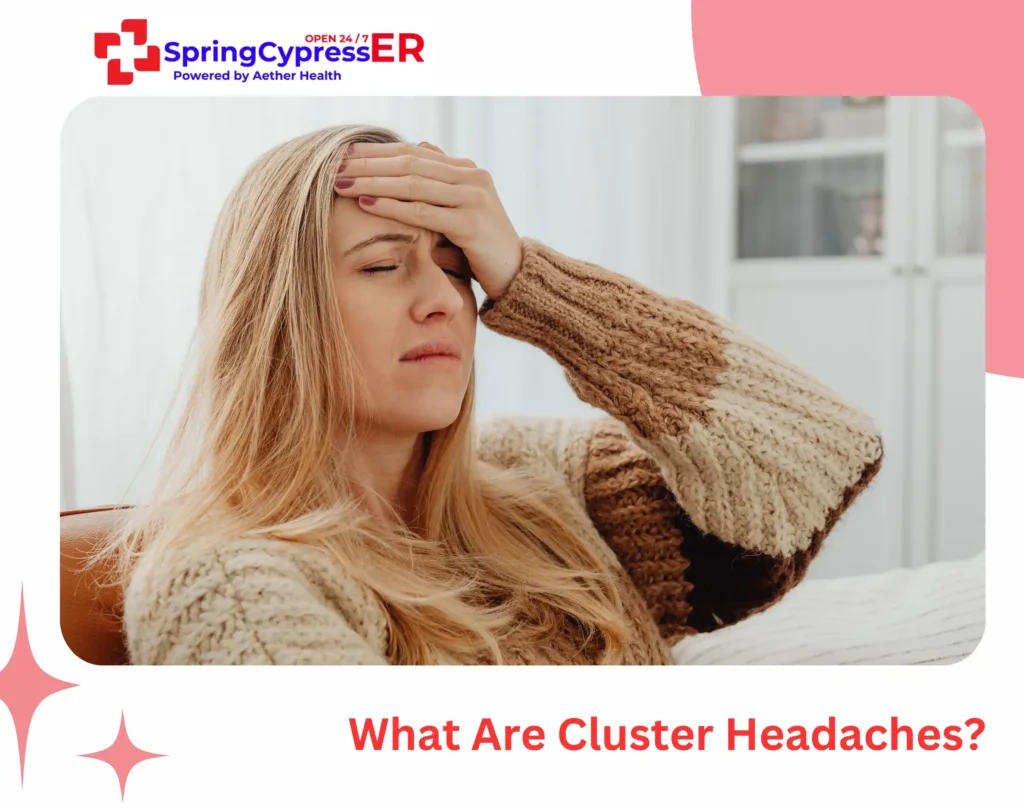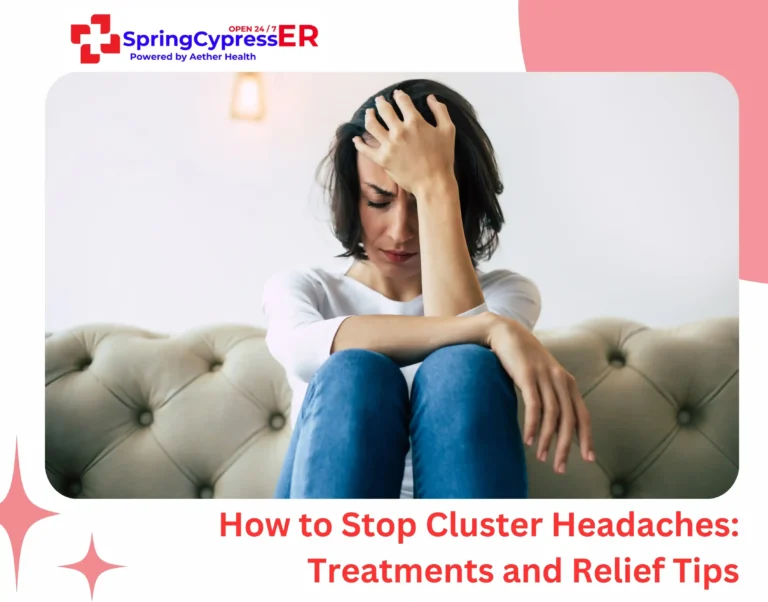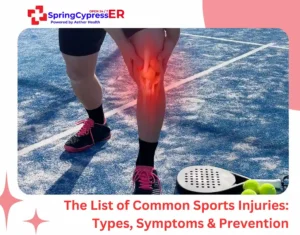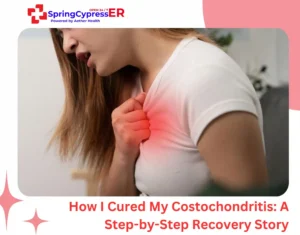Cluster headaches or “suicide headaches” are among the most painful conditions known to medicine. They’re rare, affecting about 1 in 1,000 people, which is why they’re often mistaken for sinus infections , migraines, or eye problems.
Result? People may take antibiotics or nasal sprays, which are not only ineffective but also harmful if overused. That’s why understanding the right treatments and relief tips for cluster headache is so important.
Let’s explore how to stop cluster headaches, including the most effective treatments, lifestyle changes, and emergency tips to get through an attack and help prevent it from coming back.
What Are Cluster Headaches?

Cluster headaches are among the most intense and excruciating types of headaches a person can experience. Most people describe the pain as sharp, stabbing, or burning, often centered behind one eye.
Unlike migraines, these headaches come in “clusters,” meaning several headaches strike each day during a specific stretch of time known as the cluster period.
Cluster Period: A cycle lasting weeks or months when the person has severe 1-8 headache attacks every day. After the cluster period ends, there’s usually a remission phase with no headaches for months or years.
Common Symptoms of Cluster Headaches
Cluster headaches are a type of primary headache disorder, meaning they are not caused by another underlying condition. The symptoms include:
- Come on suddenly and without warning
- It occurs several times a day, often at the same time each day
- Affect one side of the head, typically behind or around the eye
- Last from 15 minutes to 3 hours
- Happen in clusters, followed by remission periods that can last months or years
Common but Not Always Present Symptoms:
- Nasal congestion or a runny nose
- Swelling or drooping eyelid
- Redness and watering of the eye
- Facial sweating or flushing
- Small pupil (miosis)
These symptoms usually affect only one side where the pain is occurring.
What Causes Cluster Headaches?
The exact cause is not fully understood, but research suggests that cluster headaches may involve:
- Hypothalamus dysfunction: (the part of the brain that regulates sleep and biological rhythms)
- Activation of the trigeminal nerve: a major facial nerve involved in pain perception
- Histamine and serotonin imbalance
How to Stop Cluster Headaches: 4 Crucial Steps
You can take the following steps to manage your cluster headaches and find relief:
Step 1: Visit a Neurologist
A proper diagnosis is crucial because the treatments for cluster headaches are very different from treatments for tension or migraine headaches. Your doctor may order:
- A detailed history and physical exam
- Diagnostic imaging: Brain MRI or CT scan to rule out structural issues
- Laboratory testing: Blood tests to rule out other causes
Once confirmed, your care plan can begin.
Step 2: Fast-Acting Treatments for Immediate Relief
Cluster headache pain comes on fast and you don’t have time to wait for a pill to kick in. That’s why acute treatments focus on speed. Here’s how to stop cluster headaches fast:
- High-Flow Oxygen Therapy: Breathing 100% oxygen through a face mask at the start of an attack can provide rapid relief within 15–20 minutes. It’s safe and non-invasive. If you experience severe breathing problems during your headache, emergency oxygen therapy may be necessary.
- Triptans (Sumatriptan or Zolmitriptan): These are fast-acting medications often used for migraine treatment. But in cluster headaches, they’re usually injected or used as a nasal spray. They work fast, almost within 10 minutes.
- Lidocaine Nasal Spray: In some cases, nasal drops of lidocaine (a local anesthetic) can help relieve cluster headache pain when applied to the nasal cavity.
Step 3: Prevent Future Cluster Headaches
These treatments break the attack, but they don’t prevent the next one. That’s why doctors prescribe medication to keep the headaches from happening in the first place. The following medications are typically taken every day during a cluster period:
- Verapamil: A calcium channel blocker, verapamil is the most commonly used and effective preventive medication for cluster headaches. It may take time to reach full effect, so your doctor might increase the dose gradually. You’ll need regular ECG monitoring while on this.
- Lithium Carbonate: Sometimes prescribed when verapamil is not effective or in chronic cases. It requires close monitoring of blood levels. Not everyone can use triptans, especially people with heart problems, so they’re not always the first line of defense.
- Corticosteroids: Prednisone is often used at the start of a cluster period to break the cycle. It’s effective but is only used short-term due to side effects.
- Galcanezumab (Emgality): Approved by the FDA for episodic cluster headaches, this is an injectable preventive treatment.
Note: Never attempt to self-administer these treatments or adjust dosages without consulting a qualified healthcare provider. Some medications require regular monitoring and may have serious side effects or interactions with other medications.
Step 4: Avoid Known Triggers
Knowing how to stop cluster headaches isn’t just about medication, you also need to avoid these triggers, especially during a cluster period:
- Alcohol: Even small amounts can trigger an attack.
- Strong smells: Gasoline, paint fumes, perfumes.
- Overheating: Saunas, hot showers, or high heat environments.
- High altitudes: Some people report attacks at elevations above 5,000 feet.
- Sleep disruption: Poor sleep or inconsistent schedules may trigger attacks.
Natural and Home Remedies for Cluster Headaches

While medical treatments are the most effective, some people find relief with lifestyle changes and natural remedies:
- Cold compress: Applying an ice pack to the painful side may numb the nerves temporarily.
- Dark, quiet room: Avoid light and noise during an attack to minimize discomfort.
- Melatonin: Low melatonin levels have been linked to cluster headaches. If cluster headaches occur alongside high fever or severe symptoms, emergency evaluation becomes necessary.
- Magnesium supplements: Low magnesium levels may contribute to headaches in some individuals.
- Capsaicin cream: Some studies suggest applying this inside the nostril may help block pain.
Always consult your doctor before starting supplements or herbal treatments.
When to See a Doctor for Cluster Headaches

See a healthcare provider if:
- You experience severe, recurring headaches that match cluster headache symptoms
- Over-the-counter medications don’t work
- The pain wakes you up at night or follows a pattern
- You have associated symptoms like vision changes or confusion
A neurologist can confirm the diagnosis and develop a personalized treatment plan.
Final Thoughts
Understanding how to stop cluster headaches is key to regaining control of your life. Although there is no one-size-fits-all solution, timely diagnosis and treatment can make a world of difference.
If you’re in a cluster cycle and need immediate care, head to your nearest emergency room. The Aether Health emergency room in Spring Cypress is open 24/7 with fast access to oxygen therapy and diagnostic equipment. You deserve relief. And with the right approach, it is possible.
FAQs
1: How long do cluster headaches last?
Each attack can last from 15 minutes to 3 hours, and you may experience multiple attacks in a single day during a cluster period.
2: Are cluster headaches life-threatening?
While they are extremely painful and disabling, cluster headaches are not typically life-threatening. However, they can severely impact your quality of life.
3: Can diet influence cluster headaches?
While diet is not a primary cause, some people may be sensitive to certain foods or additives that trigger attacks.
4: Is there a cure for cluster headaches?
Unfortunately, there’s no cure for cluster headaches. However, many effective treatments are available to reduce the severity and frequency.
5: Can cluster headaches become chronic?
Yes, in some people, cluster headaches become chronic, meaning they occur without long pain-free intervals. This form requires continuous medical management.





